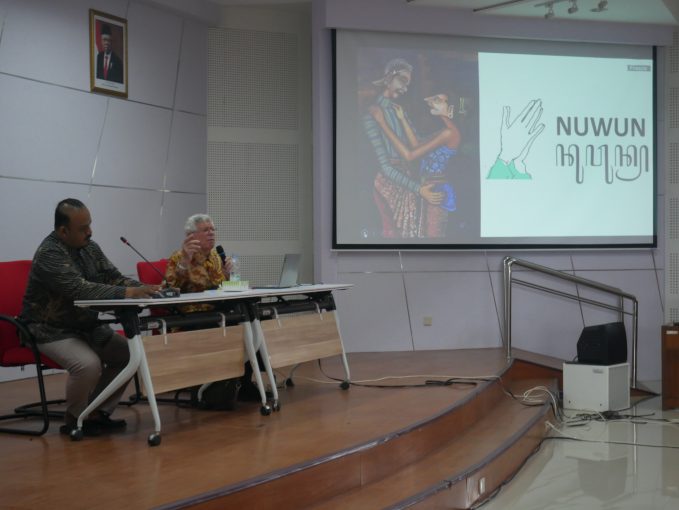
Monday, 16 October 2023, the Department of Javanese Language, Literature and Culture held a public lecture seminar entitled “Brother-Sister Love in Modern Javanese Literature: A Critique for Literary Researchers”. The seminar is free and open to the public at Soegondo Auditorium, Faculty of Cultural Sciences, Universitas Gadjah Mada. The seminar featured a senior lecturer from the Australian National University, Dr George Quinn. Rudy Wiratama, S.I.P., M.A., lecturer of Javanese Language, Literature and Culture Study Programme, Universitas Gadjah Mada also attended the seminar as moderator.
As the opening speaker, Dr George Quinn shared his educational background and his experience when he studied at Universitas Gadjah Mada. Dr George Quinn continued his presentation by discussing Javanese novels, including “Puspitasari”, “Truntum” by Siti Aminah, and “Kinanti” by Margareth Widhy Pratiwi.
In this presentation, Quinn interprets Javanese romance novels containing incestuous marriages or marriages performed by couples who have family or kinship ties from the point of view of Javanese literature. The first interpretation is that Javanese society has a perspective that the ideal love relationship between husband and wife is like the sincere love of brother and sister. Therefore, we may often hear in Javanese areas a wife calling her husband as mas, and a husband will call his wife as dik. The second interpretation is that this incestuous relationship is already owned by the ancient mythical story of the love story of Dewi Sri and Sedhana. There is also the story of Prabu Watugunung in Babad Tanah Jawi and the story of Sangkuriang from West Java.
So why do ancient myths with incest elements play a role in the development of Modern Javanese literature? It seems that these ancient stories have become a collective memory in modern times. This makes stories about romance in kinship continue to be reproduced. Apart from being fictitious stories that aim to entertain, these incestuous stories also serve as a medium to learn that incestuous relationships are something that should be avoided. The moral message is easier to understand when it is packaged in the form of myths and stories.
This seminar was nicely packaged. The topic chosen was very interesting. The audience followed the seminar carefully. The seminar was closed with a question and answer session. Hopefully this seminar can be a reflective medium for us and Javanese literature continues to develop in this modern era.

